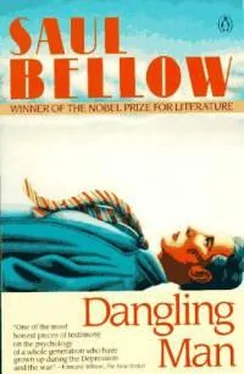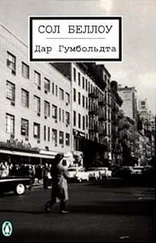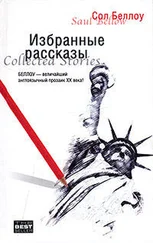Сол Беллоу - Dangling Man
Здесь есть возможность читать онлайн «Сол Беллоу - Dangling Man» весь текст электронной книги совершенно бесплатно (целиком полную версию без сокращений). В некоторых случаях можно слушать аудио, скачать через торрент в формате fb2 и присутствует краткое содержание. Жанр: Современная проза, на английском языке. Описание произведения, (предисловие) а так же отзывы посетителей доступны на портале библиотеки ЛибКат.
- Название:Dangling Man
- Автор:
- Жанр:
- Год:неизвестен
- ISBN:нет данных
- Рейтинг книги:4 / 5. Голосов: 1
-
Избранное:Добавить в избранное
- Отзывы:
-
Ваша оценка:
- 80
- 1
- 2
- 3
- 4
- 5
Dangling Man: краткое содержание, описание и аннотация
Предлагаем к чтению аннотацию, описание, краткое содержание или предисловие (зависит от того, что написал сам автор книги «Dangling Man»). Если вы не нашли необходимую информацию о книге — напишите в комментариях, мы постараемся отыскать её.
Dangling Man — читать онлайн бесплатно полную книгу (весь текст) целиком
Ниже представлен текст книги, разбитый по страницам. Система сохранения места последней прочитанной страницы, позволяет с удобством читать онлайн бесплатно книгу «Dangling Man», без необходимости каждый раз заново искать на чём Вы остановились. Поставьте закладку, и сможете в любой момент перейти на страницу, на которой закончили чтение.
Интервал:
Закладка:
@ouOtherwise the people who lived here were actually a reflection of the things they lived among. I had always striven to avoid blaming them. Was that not in effect behind my daily reading of the paper? In their businesses and politics, their taverns, movies, assaults, divorces, murders, I tried continually to find clear signs of their common humanity.
It was undeniably to, my interest to do this. Because I was involved with them; because, whether I liked it or not, they were my generation, my society, my world. We were figures in the same plot, eternally fixed together. I was aware, also, that their existence, just as it was, made mine possible. And if, as was often said, this part of the century was approaching the nether curve in a cycle, then I, too, would remain on the bottom and there, extinct, merely add my body, my life, to the base of a coming time. Thiswould probably be a condemned age. But… it might be a mistake to think of it in that way. Mists faded and spread and faded on the pane as I breathed. Perhaps a mistake. And when I thought of the condemned ages and those unnamed, lying in their obscurity, I wondered '@.
How did we know how it was? In all principal ways the human spirit must have been the same. Good apparently left fewer traces. And we were coming to know that we had misjudged whole epochs.
Besides, the giants of the last century had their Liverpools and Londons, their Lilles and Hamburgs to contend against, as we have our Chicagos and Detroits. And there might be a chance that I was misled, even with these ruins before my eyes, sod25 den, themselves the color of the fateful paper that I read daily '@.
I have spoken of an "invariable question." But the fact is that it had for many months been not in the least invariable. These were things I would have thought last winter, and now, in their troubled density, they served only to remind me of the sort of person I had been. For a long time "common humanity" and "bring myself to concede" had been completely absent from my mind. And all at once I saw how I had lapsed from that older self to whom they had been so natural.
December 18
FoRather rEvery tr, purposes, I am that older self, and if a question of my identity were to arise I could do nothing but point to my attributes of yesterday. I have not tried to bring myself up to date, either from indifference or from fear. Very little about the Joseph of a year ago pleases me. I cannot help laughing at him, at some of his traits and sayings.
Joseph, aged twenty-seven, an employee of the Inter-American Travel Bureau, a tall, already slightly flabby but, nevertheless, handsome young man, a graduate of the University of Wisconsin-major, History-married five years, amiable, generally takes himself to be well-liked. But on close examination he proves to be somewhat peculiar.
Peculiar? In what way? Well, to begin with, there is something about his appearance, something wrong. His is a long, straight-nosed, firm face. He wears a little mus. tache, which makes him look older than he really is. His eyes are dark and full, rather too full, a little prominent, in fact. His hair is black. He does not have what people call an "open" look, but is restrained-at times, despite his amiability, forbidding. He is a person greatly concerned with keeping intact and free from encumbrance a sense of his own being, its importance. Yet he is not abnormally cold, nor is he egotistic. He keeps a tight hold because, as he himself explains, he is keenly intent on knowing what is happening to him. He wants to miss nothing.
I–Iis wife does not remember him without a mustache, and he had just turned seventeen when they met. On his first visit to the Almstadts, he had smoked a cigar and talked loudly and fairly expertly (he was then a Communistggab the German Social lggemocracy and the slogan. United Front from Below." Her father had taken him for twenty-five and had angrily ordered her not to invite grown men to the house. It amuses Mr.
Almstadt to tell this story, now a family joke.
He says: "I thought he was going to carry her away to Russia."
To turn now to Joseph's dress (i am wearing his castoff clothes), it adds to his appearance of maturity. His suits are dark and conservative. His shoes, it is true, are pointed and rather dandyish, but that is possibly intended as a counterbalance. A broader toe would give you a man in his middle thirties. As he is in most things, Joseph is consciousof a motive in his choice of clothes. It is his answer to those whose defiant principle it is to dress badly, to whom a crumpled suit is a badge of freedom. He wants to avoid the small conflicts of nonconformity so that he can give all his attention to defending his inner differences, the ones that really matter. Furthermore, he takes a sad or negative satisfaction in wearing what he calls "the uniform of the times." In short, the less noteworthy the better, for his purposes. All the same, he manages to stand out.
In things of this sort his friends sometimes find him ridiculous. And, yes, he says, he admits he is on "the funny side" in many ways. But that can't be helped. The appearance and behavior of reflective men is seldom comparable to that of the less reflective, who unhesitatingly entrust all they stand for to their looks and gestures. What he is trying to do is not easy, and it is not unlikely that the more he succeeds, the more odd he may seem. Besides, he says, there is an element of the comic or fantastic in everyone. You can never bring that altogether under control.
"An element of the comic or fantastic…" such phrases have a queer ring; and people who have begun by taking him for a clerk at Inter-American, a fairly nice chap, begin to look at him with changed eyes.
But even his oldest friends, those who like John Pearl and Morris Abt have been close to him since boyhood, often find it hard to make him out. And, despite his anxiety to be understood, he cannot always help them.
Joseph, since leaving school, has not stopped thinking of himself as a scholar, and he surrounds himself with books. Before he interested himself in the Enlightenment he made a study of the early ascetics and, earlier, of Romanticism and the child prodigy. Of course, he has to earn his living, but he tries to strike a balance between what he wants and what he is compelled to do, between the necessity and the wish. A compromise exists, but then men's lives abound in such compromises. He is proud of the skill with which he manages both sides and-albeit somewhat mistakenlymlikes to refer to himself as a Machiavellian. I–Ie keeps his roles successfully distinct and even goes out of his way to be an excellent employee, simply to prove that "visionaries" can be hardheaded.
Everyone admits, however, that Joseph has a dose grasp on himself, that he knows what he wants and how to go about getting it. In the last seven or eight years he has worked everything out in accordance with a general plan. Into this plan have gone his friends, his family, and his wife. He has taken a great deal of trouble with his wife, urging her to read books of his choosing, teaching her to admire what he believes admirable. To what degree he has succeeded he does not know.
It should not be thought that Ioseph, when he speaks of the "less reflective" or of his "element of the comic," is being harsh. He is not severe toward the world. He calls himself a sworn upholder of tout comprendre cest tout pardonner. Theories of a wholly good or a wholly malevolent world strike him as foolish. Of those who believe in a wholly good world he says that they do not understand depravity. As for pessimists, the question he asks of them is, "Is that all they see, such people?" For him, the world is both, and therefore it is neither. Merely to make a judgment of that kind is, to representatives of either position, a satisfaction. Whereas, to him, judgment is second to wonder, to speculation on men, drugged and dear, jealous, ambitious, good, tempted, curious, each in his own time and with his customs and motives, and bearing the imprint of strangeness in the world. In a sense, everything is good because it exists. Or, good or not good, it exists, it is ineffable, and, for that reason, marvelous.
Читать дальшеИнтервал:
Закладка:
Похожие книги на «Dangling Man»
Представляем Вашему вниманию похожие книги на «Dangling Man» списком для выбора. Мы отобрали схожую по названию и смыслу литературу в надежде предоставить читателям больше вариантов отыскать новые, интересные, ещё непрочитанные произведения.
Обсуждение, отзывы о книге «Dangling Man» и просто собственные мнения читателей. Оставьте ваши комментарии, напишите, что Вы думаете о произведении, его смысле или главных героях. Укажите что конкретно понравилось, а что нет, и почему Вы так считаете.







